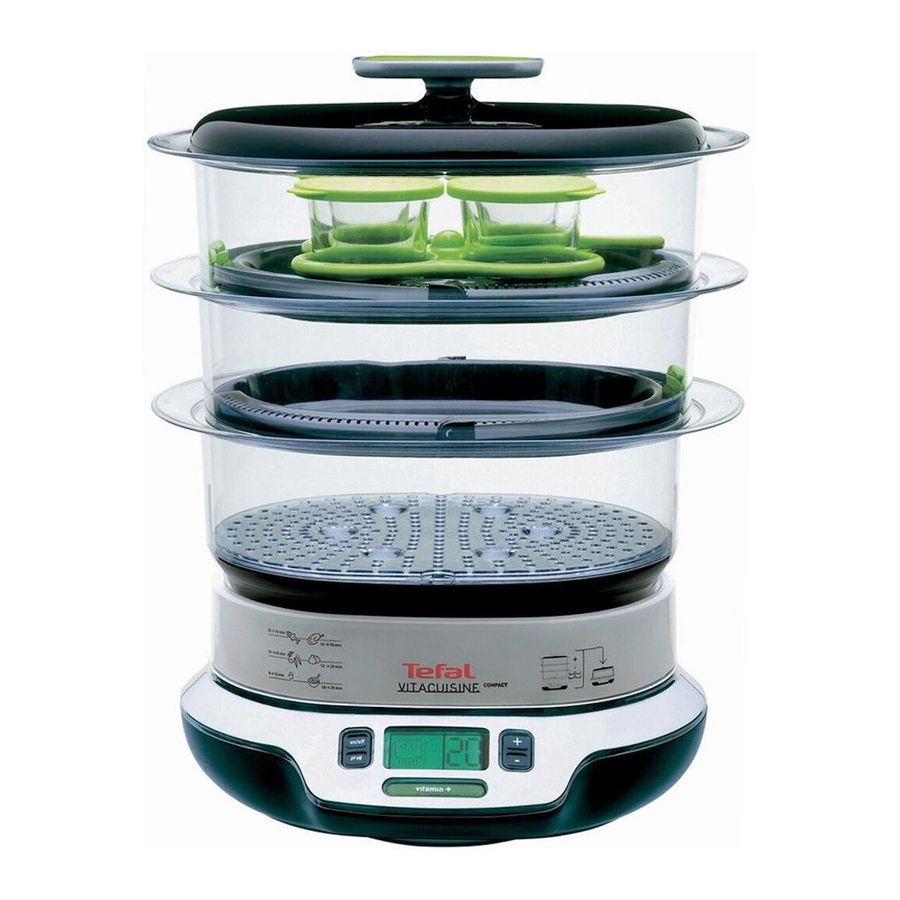
Tefal Vitacuisine Compact VS4003 Manual
- User manual (15 pages) ,
- Manual (14 pages)
Advertisement

Important safeguards
Safety instructions
- Read and follow the instructions for use. Keep them safe. This appliance is not intended to be operated using an external timer or separate remote control system. For your safety, this appliance complies with the safety regulations and directives in effect at the time of manufacture (Low-voltage Directive, Electromagnetic Compatibility, Food Contact Materials Regulations, Environment...).
- Check that the power supply voltage corresponds to that shown on the appliance (alternating current).
- Given the diverse standards in effect, if the appliance is used in a country other than that in which it is purchased, have it checked by an approved service centre.
- Do not place the appliance near a heat source or in a hot oven, as serious damage could result.
- Use a flat, stable, heat-resistant work surface away from any water splashes.
- Never leave the appliance in operation unattended. Keep away from children.
- This appliance is not intended for use by persons (including children) with reduced physical, sensory or mental capabilities, or lack of experience and knowledge, unless they have been given supervision or instruction concerning use of the appliance by a person responsible for their safety.
- Children should be supervised to ensure that they do not play with the appliance.
- Do not leave the cord hanging.
- Always plug the appliance into an earthed socket.
- Do not use an extension lead. If you accept liability for doing so, only use an extension lead which is in good condition, has an earthed plug and is suited to the power of the appliance.
- Do not unplug the appliance by pulling on the cord.
- Do not use the appliance if:
- the appliance or the cord is damaged.
- the appliance has fallen or shows visible damage or does not work properly. In the event of the above, the appliance must be sent to an approved Service Centre. Do not take the appliance apart yourself.
- If the power supply cord is damaged, it must be replaced by the manufacturer, an authorised service centre or a similarly qualified person in order to avoid any danger.
- Burns can occur by touching the hot surface of the appliance, the hot water, steam or the food.
- Always unplug the appliance:
- immediately after use,
- when moving it,
- prior to any cleaning or maintenance.
- Never immerse the appliance in water!
- Do not place the appliance near a wall or a cupboard: the steam produced by the appliance can cause damage.
- Do not move the appliance when it is full of liquids or hot foods.
- This appliance is designed for domestic use only. In case of professional use, inappropriate use or failure to comply with the instructions, the manufacturer accepts no responsibility and the guarantee does not apply.
- It is not intended to be used in the following applications, and the guarantee will not apply for:
- staff kitchen areas in shops, offices and other working environments;
- farm houses;
- by clients in hotels, motels and other residential type environments;
- bed and breakfast type environments.
- Cooking times are given as a guide only.
- Do not touch the appliance when it is steaming and use oven gloves to remove the lid and steam baskets.
- If one of the steaming cups is damaged do not use it anymore.
- For any problems or queries please contact our Customer Relations Team or consult our web site:
Helpline:
UK 0845 602 1454 www.tefal.co.uk
Ireland (01) 677 4003
Australia 02 9748 7944 www.tefal.com.au
NZ 0800 700711 www.tefal.co.nz
- If your appliance is fitted with a removable power cord: if the power cord is damaged, it must be replaced by a special cord or unit available from a Tefal authorised service centre.
- If your appliance is fitted with a fixed power cord: if the power supply cord is damaged, it must be replaced by a Tefal authorised service centre or a similarly qualified person in order to avoid any danger.
Protect the environment
- Your appliance has been designed to run for many years. However, when you decide to replaceit, remember to think about how you can contribute to protecting the environment.
- Before discarding your appliance you should remove the battery from the timer and dispose ofit at a local civic waste collection centre (according to model).

Environment protection first!

→ Leave it at a local civic waste collection point.
Description
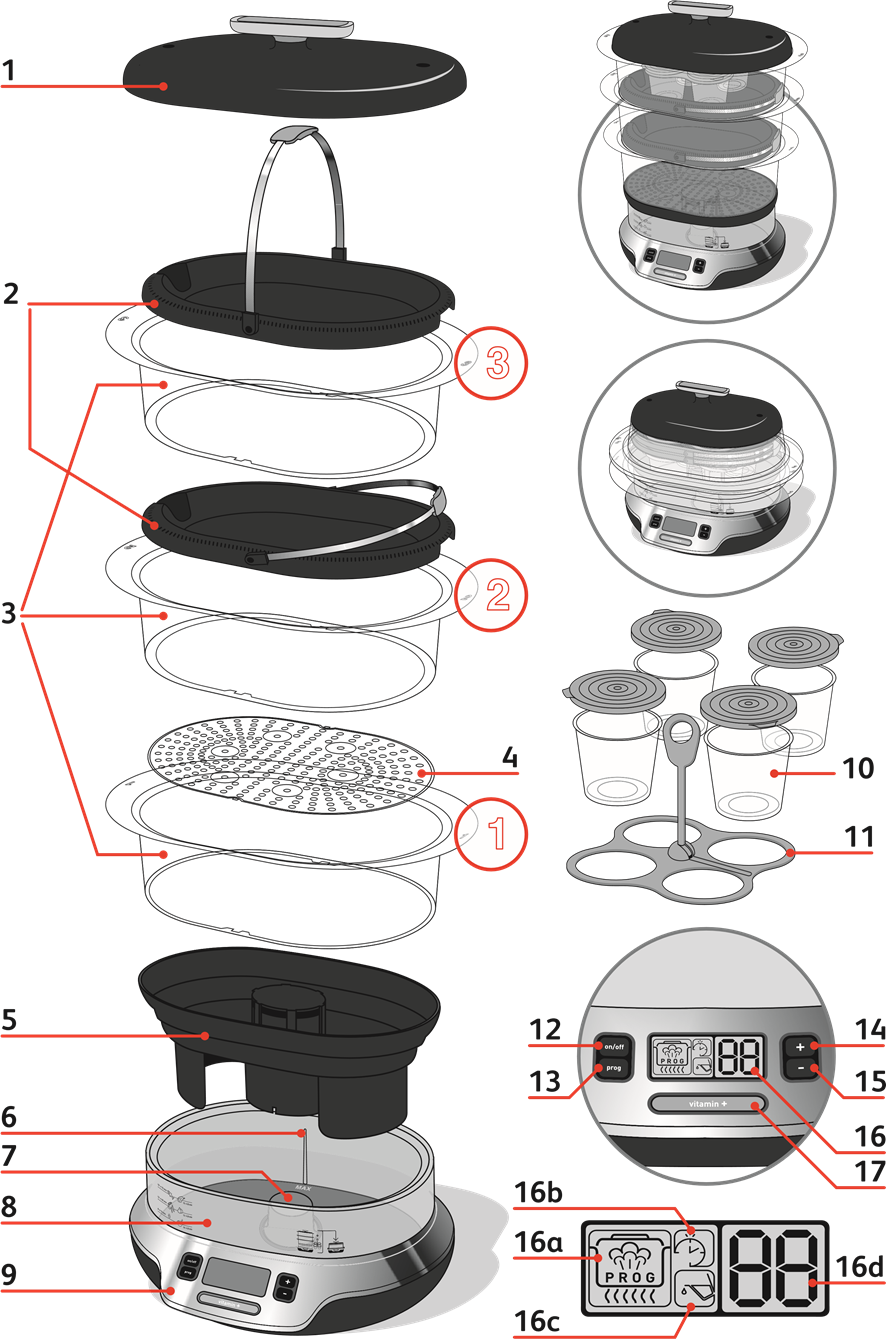
- Lid
- Cooking trays
- Steam baskets – numbered 1, 2 & 3
- Removable base
- Juice collector
- Interior water level indicator
- Heating element
- Water tank
- Power supply base
- Steaming cups and lids
- Steaming cups holder
- On/off touchpad
- Programme touchpad
- + Touchpad
- – Touchpad
- LCD screen
- Cooking level indicator
- Clock
- Low water level indicator
- Timer
- « vitamin + » touchpad
Instructions for Use
Before first use
- Clean the water tank using a damp, non-abrasive sponge - fig. 1.
![]()
- Wash all removable parts using warm water and washing up liquid, rinse and dry.
Do not immerse the power supply base in water.
Fill the water tank
Do not use seasoning, herbs or any liquid other than water in the water tank. Ensure that the water tank (8) is filled with water to the maximum level before using the steamer.
- Pour cold water directly into the water tank up to the maximum level (1.5 litre) - fig. 2.
![]()
- Position the juice collector on the water tank - fig. 3.
![]()
- Place the removable base (4) in basket 1 and the cooking trays in baskets 2 and 3, if required - fig. 4.
![]()
- Put baskets 1, 2 and 3 with their bases in position and then the lid - fig. 5.
![]()
- Use fresh water with each use and check that the water tank is filled to the maximum level.
Cooking
Choose the cooking time
- Plug the steamer in and switch on: a beep sounds and displayed - fig. 6.
![]()
- If no other action is taken, the screen goes blank and the steamer switches to standby mode after 2 minutes.
![]()
- Set the cooking time using the + and – touchpads (max. 60 min) - fig. 7.
![]()
- 5 sec. later (or on a short press of the on/off touchpad) steam cooking begins. The « vitamin + » touchpad lights up and the cooking symbol
![]() is displayed - fig. 8.
is displayed - fig. 8.
![]()
- You can alter the cooking time at any point after cooking has started by pressing the + or – touchpad - fig. 7.
- During cooking, the time displayed reduces by minutes and then by seconds in the last minute.
A long press on the + or – touchpad allows you to increase or decrease the cooking time more quickly.
Using the « vitamin + » touchpad
After a few minutes cooking, you can manually stop the « vitamin + » programme by pressing the illuminated touchpad - fig. 9.
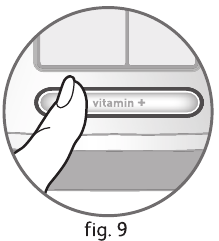
- Your steamer is fitted with a « vitamin + » touchpad which reduces cooking time and preserves the full vitamin content.
- The touchpad lights up when cooking starts. This allows a faster start to the cooking process owing to a higher steam output.
- The « vitamin + » touchpad light goes out automatically when the quantity of steam is sufficient for the cooking process.
- If the « vitamin + » touchpad is not illuminated and you intervene during the cooking process (such as inserting a basket, removing the lid to check the cooking progress, etc.), press the « vitamin + » touchpad to replace the lost steam - fig. 9.
During cooking
If ![]() is displayed (+ sound alarm) - fig. 10 carefully remove the baskets and juice collector using oven gloves, add water up to the maximum level. The steamer will automatically continue the cooking process.
is displayed (+ sound alarm) - fig. 10 carefully remove the baskets and juice collector using oven gloves, add water up to the maximum level. The steamer will automatically continue the cooking process.

Do not touch hot surfaces or hot food during cooking. Use oven gloves.
If the water tank is empty, the steamer stops heating.
Delayed start
The delayed start time can be changed at any point.
- Set the cooking time using the + and – touchpads (max. 60) fig. 7.
- Press the Prog touchpad - fig. 14.
![]()
The programming symbol![]() is displayed and the clock
is displayed and the clock ![]() flashes.
flashes. - Select the time at which cooking is to finish - fig. 7 (going up in 15 min, then hourly steps).
- 5 sec. later the delayed start is operational and the clock
![]() disappears. A beep then sounds for a few seconds indicating cooking has been set.
disappears. A beep then sounds for a few seconds indicating cooking has been set. - At the end of the delay period, the steamer automatically switches to cooking mode.
Keep warm function
While the keep warm function is in operation, no other action is possible, except stop when required.
- A beep sounds twice at the end of the cooking time.
- The keep warm function starts automatically at the end of the cooking process, and the keep warm symbol
![]() is displayed - fig. 11.
is displayed - fig. 11.
![]()
- The keep warm time elapsed (since the end of cooking) is displayed.
Removing the food
- Remove the lid by the handle.
- Remove the cooking trays and steaming baskets using the handles - fig. 12 and 13
![]()
![]()
- Serve the food.
Use oven gloves when handling the baskets, handles and lid.
To stop the steamer
If you want to switch off the steamer when the « low water level » indicator is on, you must press twice on the on/off touchpad.
- One press on the on: off touchpad stops the keep warm function - fig. 15.
![]()
- A second press puts the steamer on standby
![]() .
. - After 1 hour in keep warm mode, the steamer switches to standby mode. The light goes out
![]() .
. - Unplug the steamer.
Table of cooking times
Cooking times are approximate and may vary depending on the size of the food, the space between the food, the amount of food, individual preferences, and the mains voltage.
Use oven gloves when handling the baskets during the cooking time.
Meat - Poultry
| Preparation | Type | Quantity | Cooking time | Recommendations |
| Chicken breast (boneless) | Fresh Whole | 350 g | 20 min | 2 chicken breast in a steam basket |
| Small pieces | 450 g | 17 min | ||
| Chicken drumsticks | Fresh Whole | 2 | 36 min | |
| Turkey escalope | Thin | 600 g | 24 min | |
| Pork fillet | Fresh | 700 g | 38 min | Cut in 1 cm thickness slice |
| Lamb steak | Fresh | 500 g | 14 min | |
| Frankfurters | Fresh | 10 | 10 min |
Fish - Shellfish
| Preparation | Type | Quantity | Cooking time | Recommendations |
| Thin fish fillets (cod, haddock, plaice, sole, salmon...) | Fresh | 450 g | 15 min | |
| Frozen | 370 g | 18 min | ||
| Fish steaks (cod, haddock, plaice, sole, salmon...) | Fresh | 400 g | 15 min | |
| Whole fish (trout, salmon trout, sea bass) | Fresh | 600 g | 25 min | |
| Mussels | Fresh | 1 kg | 20 min | |
| Prawns | Fresh | 200 g | 5 min | |
| Scallops | Fresh | 100 g | 5 min |
Vegetables
| Food | Type | Quantity | Cooking time | Recommendations |
| Artichoke | Fresh | 2 | 55 min | Whole in steam basket 1 and 2 (without cooking trays) |
| Potatoes | Fresh | 600 g | 20 min | Sliced or cubed. Small new potatoes can be cooked whole |
| Asparagus | Fresh | 600 g | 17 min | |
| Broccoli | Fresh | 500 g | 18 min | Small florets |
| Frozen | 500 g | 18 min | ||
| Celeriac | Fresh | 350 g | 22 min | In cubes |
| Mushrooms | Fresh | 500 g | 22 min | Whole |
| Cauliflower | Fresh | 1 medium | 19 min | Small florets |
| Cabbage (red-green) | Fresh | 600 g | 22 min | Sliced |
| Courgette | Fresh | 600 g | 12 min | Sliced |
| Spinach | Fresh | 300 g | 13 min | Toss halfway through cooking |
| Frozen | 300 g | 15 min | ||
| Fine green beans | Fresh | 500 g | 35 min | |
| Frozen | 500 g | 35 min | ||
| Carotts | Fresh | 500 g | 15 min | Thinly sliced |
| Corn on the cob | Fresh | 500 g | 45 min | |
| Green beans | Fresh | 500 g | 35 min | Whole |
| Leeks | Fresh | 500 g | 30 min | Sliced |
| Sweet peppers | Fresh | 300 g | 20 min | Cut in wide strips |
| Peas | Fresh | 400 g | 20 min | Shelled |
| Frozen | 400 g | 20 min |
Rice
| Food | Weight | Quantity | Cooking time | Recommendations |
| For one cup of white long grain or basmati | g | ml | min | Wash rice well before cooking. Place rice and cold water in the steaming cup without the lid on. Use steam basket n° 3. |
Fruits
| Food | Type | Quantity | Cooking time | Recommendations |
| Pears | Fresh | 4 | 25 min | With steam basket 1 and 2 (without cooking trays). Steam whole or halved. |
| Bananas | Fresh | 4 | 15 min | Whole |
| Apples | Fresh | 5 | 20 min | Quartered |
Steaming Tips and Techniques
- Do not pack food too tightly in the steam baskets. Leave some space for steam to circulate as much as possible.
- For best results, use pieces of food of approximately the same size (such as potatoes, vegetables and chicken breasts) so that they cook at the same time. The size and thickness of the food will alter the cooking time.
- Avoid lifting the lid to check on the cooking progress too often, as this allows loss of steam and can lengthen the cooking time.
- If recipes require the use of cling film, always use the all purpose type suitable for use in microwave ovens. Cling film is often used to prevent condensation forming and spoiling delicates foods such as egg custards. Avoid using foil as this tends to increase the steaming time.
- When choosing food for steaming, select suitable size food to fit the steaming basket, especially if it is cooked whole such as fish.
- Subtle flavour can be given to steamed food with the addition of fresh herbs, slices of lemon or orange, garlic and onion. These may be placed either directly underneath or on top of the food in the steaming basket.
- To give meat, poultry and fish a delicious flavour plus make then moist and tender, marinade for a few hours before steaming. The marinade can be as simple as a blend of wine and fresh herbs, or it can be a spicy barbecue or tandoori mix.
- Frozen vegetables can be steamed from frozen. All shellfish, poultry and meat must be completely thawed before steaming.
- For some recipes with a long cooking time, such as steamed sponge pudding, you will need to top up with more cold water during steaming.
- Always use oven gloves when handling the baskets or steaming cups during or after cooking.
Steaming Cup Recipes
Preparing steaming cup recipes
You can cook recipes in the steaming cups, either from the steamer recipe book or from your own recipes. Put the prepared mixture into the cups, taking care not to overfill them to prevent spillages as some recipes may rise during cooking. Cover the cups if necessary, using the lids. Place the four cups in the holder fig. 16.

Take the holder by the handle and place it in the basket - fig. 17.
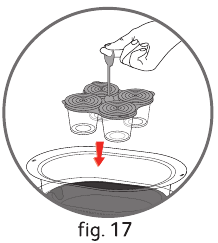
The cups must always be placed in the top basket (basket no. 3) immediately under the lid.
Removing the steaming cups
Use oven gloves. Remove the lid by the handle. Remove the cups using the holder handle. Take the cups out of the holder and remove the lids (if your recipe uses lids). If necessary you can cool the cups by standing them in cold water. Do this using the holder. Wait until the cups are at room temperature before placing them in the refrigerator. Serve the recipe in the cups.
Maintenance and cleaning
Cleaning the steamer
- Unplug the steamer after use.
- Allow it to cool completely before cleaning.
- Check that the steamer has cooled completely before emptying the juice collector and water tank.
- Wash all removable parts using warm water and washing up liquid, rinse and dry.
- All parts except the power supply base are dishwasher safe.
Descaling your steamer
For best results, descale the steamer after every 8 uses. To do this:
- Remove the juice collector.
- Pour 1 litre of cold water into the water tank.
- Add 1 glass (about 150 ml) of white vinegar (available from hardware stores).
- Leave it to descale overnight.
- Rinse out the inside of the water tank several times using warm water.
- Do not use other scale removing products.
Storage
- Store the steaming cups with the lids inside the juice collector.
- Turn basket 1 upside down on to the base.
- Put the two cooking trays on top of bowl 1 - fig. 18
![]()
- Put bowl 2 inside bowl 3, then turn them both upside down and place them on the base. Put the cups holder on top and then the lid - fig. 19.
![]()
All parts can be stored inside the steamer.

Documents / Resources
References
Tefal UK : innovative leader in kitchen and home appliances - Tefal
Tefal™ Australia | Cookware, Kitchenware, Recipes & More
Tefal™ New Zealand | Cookware, Kitchenware, Recipes & More
Download manual
Here you can download full pdf version of manual, it may contain additional safety instructions, warranty information, FCC rules, etc.
Advertisement
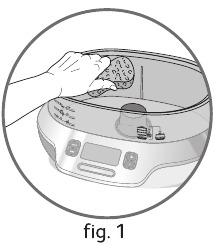
































Need help?
Do you have a question about the Vitacuisine Compact and is the answer not in the manual?
Questions and answers